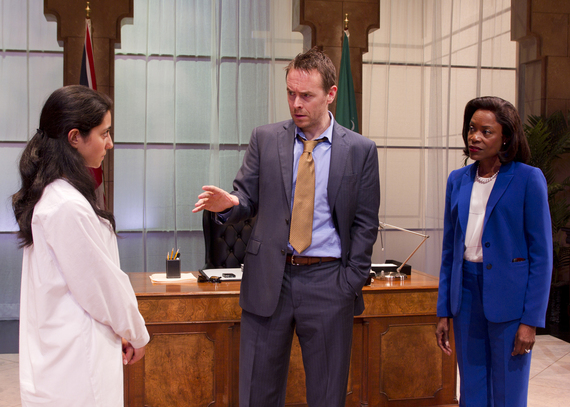Theresa Rebeck's dramatic essay on the many layers of conflict in the Middle East - political, religious, cultural and diplomatic - is a deftly drawn piece of Shavian drama that satisfies on several levels. Under the light hand of director Marc Masterson and with a strong acting ensemble, Rebeck accomplishes what few American playwrights attempt, and fewer still accomplish, a drama of ideas that is both intellectually sophisticated and engaging.
Wading into the murky and turbulent waters of the Middle East is dangerous for any writer, particularly an American playwright, considering the tattered history of the United States in the region. But Rebeck makes this courageous journey with considerable success. Her goal is to traverse the difficult counterpoints between American attitudes towards feminism, religion, culture and politics, which are largely idealistic, optimistic and arguably naive with European old-world, balance-of-power cynicism on the one hand and Arab and Islamic religious traditions, culture and politics on the other hand.
It all makes for a heady clash of ideas when an Iranian Shia Joan of Arc (Nikki Massoud) arrives in Saudi-run Mecca as part of a protest of women who remove their head-covering hijabs during the pilgrimage of the Hajj. Fireworks ensue when she shows up at the sleepy British consular office of Edgar (Alan Smyth), a long-suffering, cynical but dedicated diplomat, who is at that very moment entertaining the African-American Undersecretary of State (Charlayne Woodard), who also happens to be a Muslim.
From racism to feminism, from post-colonialism to anti-capitalism, from atheism to religious zealotry and from the naïve idealism of American diplomacy to the corruption of balance of power politics, Rebeck races through a heady gallop of ideas. While this is largely an exercise of setting up and quickly knocking down straw men, and using the characters as vehicles for intellectual combat in the style of George Bernard Shaw, the twists and turns of the argument are the power of this drama, rather than its emotional content.
The acting is solid, with Smyth providing an energetic defense of the status quo and Woodard providing emotional power in the pursuit of change. Meanwhile, Massoud is often riveting in the simplicity of her message, which is essentially that God has shown her the way and she will not be dissuaded from her chosen path - an argument that is heard often today from zealots of all stripes. In this skillful, well-crafted drama, Rebeck has given us lots to think about and, thankfully, no solutions to what may be an insoluble conundrum.

